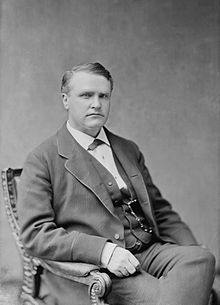Stephen B. Elkins
| Stephen Benton Elkins | |
|---|---|
 |
|
|
United States Senator from West Virginia |
|
|
In office March 4, 1895 – January 4, 1911 |
|
| Preceded by | Johnson N. Camden |
| Succeeded by | Davis Elkins |
| 38th United States Secretary of War | |
|
In office December 17, 1891 – March 5, 1893 |
|
| President | Benjamin Harrison |
| Preceded by | Redfield Proctor |
| Succeeded by | Daniel S. Lamont |
| Member of the U.S. House of Representatives from New Mexico Territory's At-large district |
|
|
In office March 4, 1873 – March 3, 1877 Delegate |
|
| Preceded by | José Manuel Gallegos |
| Succeeded by | Trinidad Romero |
| Personal details | |
| Born |
September 26, 1841 New Lexington, Ohio, U.S. |
| Died | January 4, 1911 (aged 69) Washington, D.C., U.S. |
| Political party | Republican |
| Spouse(s) | Sarah Jacobs Hallie Davis |
| Alma mater |
Masonic College University of Missouri |
| Profession | Politician, Lawyer |
| Military service | |
| Service/branch | Union Army |
| Rank | Captain |
| Battles/wars | American Civil War |
Stephen Benton Elkins (September 26, 1841 – January 4, 1911) was an American industrialist and political figure. He served as the Secretary of War between 1891 and 1893. He served in the Congress as a Delegate from the Territory of New Mexico and a Senator from West Virginia.
Stephen Benton Elkins was born on September 26, 1841 near New Lexington, Ohio and moved with his family to Westport, Missouri (now part of Kansas City) in the mid-1840s to Philip Duncan Elkins and Sarah Pickett Withers. He attended the Masonic College in Lexington, Missouri in the 1850s, and graduated from the University of Missouri in Columbia in 1860. After graduation, he briefly taught school in Cass County, Missouri. Among his pupils was future James-Younger Gang member Cole Younger.
In the American Civil War Elkins' father and brother joined the Confederate Army under Sterling Price, but he joined the Union Army. Before he joined the Union Army he was to encounter Quantrill's Raiders twice and was spared from being killed because of his father and brother. He noted:
Elkins entered the Union Army as a captain of militia in the 77th Missouri Infantry. He served under Kersey Coates and only saw action once in the Battle of Lone Jack, which he said filled him with disgust for war. Elkins noted that his good fortune of being protected by Quantrill matched a fear of being butchered by Quantrill for becoming a Union soldier as Quantrill's Raiders were thought to be present at the battle.
...
Wikipedia
